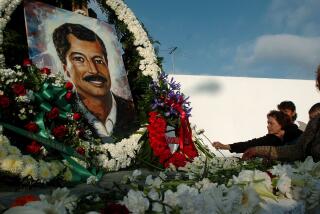Mexico Stocks and Peso Tumble Amid Inaction on Economic Plan
- Share via
MEXICO CITY — Mexico’s currency and stock markets--battered by high interest rates and national uncertainty--were sucked Monday into the vacuum left by the government’s failure to announce a new economic program in response to the country’s deepening crisis.
The Bolsa index fell 4.77% to 1,447.52, its lowest level in more than two years, while the peso weakened from 5.95 to as many as 6.08 to the dollar, before closing at 5.97.
Investors dumped stocks and bought dollars after the government--instead of developing a new economic plan over the weekend, as had been expected--disclosed a cover-up in the investigation of last year’s assassination of leading presidential candidate Luis Donaldo Colosio.
Those developments only fueled concerns about political stability that are at the heart of the economic crisis.
Analysts linked the market reaction directly to a brief Labor Ministry statement Monday that the government is evaluating economic indicators this week and, as a result, “may eventually” adjust the emergency austerity plan announced Jan. 3.
The announcement was a disappointment because a new strategy had been widely expected to replace last month’s market stabilization program, which is generally seen as anachronistic and a failure. The peso has fallen 43% and the stock market has lost 38% since the currency was devalued Dec. 20.
The Jan. 3 plan was based on a peso valued at 4.5 to the dollar, annual inflation of 19% and 1% yearly growth. The currency has not reached 4.5 since the plan was announced, inflation was 6.8% for the first six weeks of the year, and economists anticipate that the economy may shrink as much as 4% in 1995.
“The economy is not going to start to function until there is an economic program that is convincing for Mexicans and investors,” economist Luis Rubio said.
A meeting among government officials, labor leaders and business had been anticipated last weekend to announce a new program following the signing of the $20-billion U.S. rescue package for Mexico.
Instead, Mexican Atty. Gen. Antonio Lozano disclosed late Friday that evidence had been tampered with at the scene of Colosio’s death last March, and Lozano announced the arrest of a man suspected of being a second gunman in the assassination. Two previous special prosecutors had concluded that the killing was the act of a lone gunman.
Colosio’s death was followed by a major flight of foreign capital from the Mexican stock market in April, 1994.
The pessimism stemming from the lack of a new economic project was reinforced by a continuing stream of bad news.
Banco Nacional de Mexico, the nation’s largest commercial bank, announced plans Monday to cut its payroll by a third in the first quarter. The number of jobs to be eliminated has not yet been determined, according to bank officials, but analysts predict that 6,000 or more of the bank’s 33,000 employees could be laid off.
Those job losses will be added to last month’s highly publicized layoffs at automotive plants.
The number of workers insured by the Mexican Social Security Institute--the most accurate indicator of private-sector employment--fell by 125,000, or 1.4%, in January, officials said.
More to Read
Sign up for Essential California
The most important California stories and recommendations in your inbox every morning.
You may occasionally receive promotional content from the Los Angeles Times.












